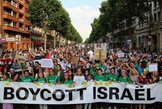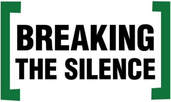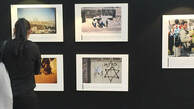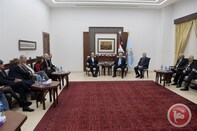5 dec 2019

European Union (EU) countries’ are taking steps towards boycotting the Israeli apartheid system, using its legal, legislative and parliamentary institutions to oppose the occupation, Palestine News Network reported.
The EU condemned the Trump administration’s positions and policies carried out in the Palestinian Territories, occupied by Israel since 1967, especially in Jerusalem regarding the Israeli settlements, and the two-state solution.
Within this context, the EU’s Supreme Court has approved labeling Israeli goods produced in settlements built in the Palestinian territories, and exported to the EU. It should also be noted that the EU always asserts that settlements are “illegal, and are an obstacle for achieving peace.”
At the international level, events and activities highlighted the growing international determination to end the Israeli occupation, condemning its ongoing crimes against the Palestinian people, as well as its denial of their legitimate rights recognized by many UN resolutions.
Within the framework, Harvard Law School students left a conference hall in New York soon after the Israeli Consul, Danny Dayan, started his speech about the legality of the Israeli settlements.
A video was aired showing the students leaving the hall, but the students went on their stand of solidarity outside the hall, holding up banners that read “Israeli settlements are illegal”, and “settlements are war crimes.”
In Canada, scores of students and demonstrators, in solidarity with Palestinian, protested at the York University Campus in Toronto, as it hosted Israeli Occupation Army’s reservist soldiers, who came to talk about their experiences while serving in the Army. They also organized campaign anti-hosting such soldiers, and chanted slogans such as “no for hosting killers,” and “Free Palestine.”
In Switzerland, the Algerian National Deaf Team withdrew from the International Futsal Championship, held in Switzerland vis-a-vis the Israeli Occupation National Team, stressing that Algerians reject normalization of relations with Israel.
In Turkey, former UN rapporteur in Palestine, Richard Falk announced the formation of an international coalition to encounter and dismantle the Israeli apartheid system in the Palestinian Territories, using all possible legal means, including boycott activities.
In the Netherlands, the Dutch government announced in Parliament that it would continue to carry out the European policy of labeling the Israeli settlements’ goods, in line with the Luxemburg Court of Justice’s resolution.
In Sweden, the new Foreign Minister, Anne Linda, said that the Boycott, Divestment and Sanctions (BDS) movement is a legitimate movement, and that her country’s government “doesn’t see a similarity between its activities and any other activities of anti-Semitism.” Stating that BDS is a non-violent movement concerned with human rights, democracy, freedom of expression, and ending occupation.
In the US, 107 lawmakers of the democratic members at the US House of Representatives signed a petition calling on Secretary of State, Mike Pompeo to reverse the decision to legalize Israeli settlements in the West Bank.
The petition came days after Pompeo’s announcement that his country no longer considers Israeli settlements in the West Bank to violate the International Law.
Lawmakers expressed their strong rejection of the State Department’s decision.
Within the same context, 5 EU countries rejected the new American position on Israeli settlements; France, Germany, Britain, Belgium and Poland in a joint statement, made it clear that “every settlement activity is illegal under international law, undermining the possibility of a two-state solution, and the prospect of lasting peace. Thus, we call on Israel to ban all settlement activities.”
Moreover, a recent poll on the BDS movement showed that, most democrats view it as a legitimate movement, with aims to pressure Israel to comply with international resolutions and laws, to stop settlements and end the Israeli occupation of Palestine.
Israeli Authorities deported director of Human Rights Watch, Omar Shaker from Israel and the Palestinian territories, claiming that he is pro-BDS and participates in its anti-Israel activities.
In Palestine, the Luxembourg Court of Justice’s resolution to label Israeli settlements’ goods, was considered to be a victory to be added to a series of moral attitudes that support the legitimate national rights of the Palestinian people, and dismiss the Israeli claims.
In its weekly report, the National Bureau for Defending the Land and Resisting Settlements welcomed the Luxembourg Court of Justice’s resolution on the legality of the labeling Israeli settlements’ goods, which were established in the Palestinian territories occupied by Israel in 1967.
The Bureau described the resolutions as a long-awaited moral victory, as a result of hard-work and formidable efforts, led by BDS in the EU countries to isolate the Israeli apartheid system in the Occupied Palestinian Territories.
Likewise, the Palestinian National Boycott Committee and BDS’ leadership worldwide welcomed the decision approved by the newly elected Oslo City’s Council led by the Socialist Left Party -SV- and the Labor and Green parties, to ban Israeli settlement goods and services.
The EU condemned the Trump administration’s positions and policies carried out in the Palestinian Territories, occupied by Israel since 1967, especially in Jerusalem regarding the Israeli settlements, and the two-state solution.
Within this context, the EU’s Supreme Court has approved labeling Israeli goods produced in settlements built in the Palestinian territories, and exported to the EU. It should also be noted that the EU always asserts that settlements are “illegal, and are an obstacle for achieving peace.”
At the international level, events and activities highlighted the growing international determination to end the Israeli occupation, condemning its ongoing crimes against the Palestinian people, as well as its denial of their legitimate rights recognized by many UN resolutions.
Within the framework, Harvard Law School students left a conference hall in New York soon after the Israeli Consul, Danny Dayan, started his speech about the legality of the Israeli settlements.
A video was aired showing the students leaving the hall, but the students went on their stand of solidarity outside the hall, holding up banners that read “Israeli settlements are illegal”, and “settlements are war crimes.”
In Canada, scores of students and demonstrators, in solidarity with Palestinian, protested at the York University Campus in Toronto, as it hosted Israeli Occupation Army’s reservist soldiers, who came to talk about their experiences while serving in the Army. They also organized campaign anti-hosting such soldiers, and chanted slogans such as “no for hosting killers,” and “Free Palestine.”
In Switzerland, the Algerian National Deaf Team withdrew from the International Futsal Championship, held in Switzerland vis-a-vis the Israeli Occupation National Team, stressing that Algerians reject normalization of relations with Israel.
In Turkey, former UN rapporteur in Palestine, Richard Falk announced the formation of an international coalition to encounter and dismantle the Israeli apartheid system in the Palestinian Territories, using all possible legal means, including boycott activities.
In the Netherlands, the Dutch government announced in Parliament that it would continue to carry out the European policy of labeling the Israeli settlements’ goods, in line with the Luxemburg Court of Justice’s resolution.
In Sweden, the new Foreign Minister, Anne Linda, said that the Boycott, Divestment and Sanctions (BDS) movement is a legitimate movement, and that her country’s government “doesn’t see a similarity between its activities and any other activities of anti-Semitism.” Stating that BDS is a non-violent movement concerned with human rights, democracy, freedom of expression, and ending occupation.
In the US, 107 lawmakers of the democratic members at the US House of Representatives signed a petition calling on Secretary of State, Mike Pompeo to reverse the decision to legalize Israeli settlements in the West Bank.
The petition came days after Pompeo’s announcement that his country no longer considers Israeli settlements in the West Bank to violate the International Law.
Lawmakers expressed their strong rejection of the State Department’s decision.
Within the same context, 5 EU countries rejected the new American position on Israeli settlements; France, Germany, Britain, Belgium and Poland in a joint statement, made it clear that “every settlement activity is illegal under international law, undermining the possibility of a two-state solution, and the prospect of lasting peace. Thus, we call on Israel to ban all settlement activities.”
Moreover, a recent poll on the BDS movement showed that, most democrats view it as a legitimate movement, with aims to pressure Israel to comply with international resolutions and laws, to stop settlements and end the Israeli occupation of Palestine.
Israeli Authorities deported director of Human Rights Watch, Omar Shaker from Israel and the Palestinian territories, claiming that he is pro-BDS and participates in its anti-Israel activities.
In Palestine, the Luxembourg Court of Justice’s resolution to label Israeli settlements’ goods, was considered to be a victory to be added to a series of moral attitudes that support the legitimate national rights of the Palestinian people, and dismiss the Israeli claims.
In its weekly report, the National Bureau for Defending the Land and Resisting Settlements welcomed the Luxembourg Court of Justice’s resolution on the legality of the labeling Israeli settlements’ goods, which were established in the Palestinian territories occupied by Israel in 1967.
The Bureau described the resolutions as a long-awaited moral victory, as a result of hard-work and formidable efforts, led by BDS in the EU countries to isolate the Israeli apartheid system in the Occupied Palestinian Territories.
Likewise, the Palestinian National Boycott Committee and BDS’ leadership worldwide welcomed the decision approved by the newly elected Oslo City’s Council led by the Socialist Left Party -SV- and the Labor and Green parties, to ban Israeli settlement goods and services.
26 july 2019

[[Breaking The Silence is an organization of veteran combatants who have served in the Israeli military since the start of the Second Intifada, and have taken it upon themselves to expose the Israeli public to the reality of everyday life in the Occupied Territories.
They endeavor to stimulate public debate about the price paid for a reality in which young soldiers face a civilian population on a daily basis, and are engaged in the control of that population’s everyday life. Their work aims to bring an end to the occupation.]]
Number: 4323
Rank: First Sergeant
Unit: Nahal, 50th Battalion
Area: Nablus area
Can you expand on the issue of ‘red lines?’ What is the guideline?
When you see the map of the red lines, your whole concept changes, because the area looks as if it’s [full of] 99% Palestinians, with something like three small settlements. But when you suddenly look at it, even zooming out, at the whole Samaria area, you understand that Palestinians are actually banned from entering a huge chunk of it, they can’t hang around there. Around every such settlement there’s a circle, a radius of one kilometer, a huge area you’re not allowed to enter if you’re Palestinian. Now this area is really uncultivated, but I don’t know what it would be, if Palestinians were allowed to enter it.
And can the settlers enter?
Yes, yes. You take the settlement as the center, draw a radius, a circle around it, and that’s the area, that, like, Palestinians aren’t allowed to approach settlements, they’re forbidden to arrive at the settlement fence, they have to stop further away.
Is there any difference, from this aspect, between a settlement and an [illegal] outpost?
No.
Is such a perimeter defined around, West Tapuach, for example?
Yes, Yes.
If the idea is to create a sort of security zone, then the moment the settlers are allowed to enter, it sorts of defeats the whole purpose.
Yes, it’s a unilateral buffer zone, and that, more or less, is the story of West Tapuach. West Tapuach is in the Tapuach buffer zone, so settlers can easily come there. The moment they built an outpost, there was a need to enlarge the buffer zone, around West Tapuach as well, and that’s how these zones are created, that you can sort of hop through them to the hills. On the terrain we don’t see this line, I mean we don’t know, and when we arrive we always expel them [the Palestinians]. If he’s really close, then we can already try to arrest him, to interrogate him. Usually that doesn’t happen. Usually we’re informed about someone who is pretty far away from the settlement.
Can you tell us the distance, more or less?
500 meters. That’s the area that we drive them away, but don’t treat them as suspects. We drive up to the guy and expel him.
And the Palestinians that did approach, who were they?
Very often it’s adult men, even old men. A man who drives his car in the area, on his way to an olive grove, but it’s an olive grove he’s not allowed to enter, stuff like that.
There are olive groves within the red area?
It’s an area that was probably harvested in the past, it has about six trees here and there. An area with olive trees, but not ordered like an olive grove. Many times they come there with a feeling that it’s their land, that they want to be there, not necessarily in the harvest season. We don’t arrive there on our initiative, if the civilian security coordinator (CSC, a civilian settler employed by the Israeli Ministry of Defense to oversee settlement security detail) saw something, or someone called the CSC, then we’ll come, but it’s not really an area we try to keep empty.
And did it ever happen that you came and saw and said: no, he’s not close enough and we don’t have to expel him from here?
No, no.
You’ll always tell him to go?
Yes, because it’s conceived as a very minor act. We don’t arrest him, we just tell him to go away.
They endeavor to stimulate public debate about the price paid for a reality in which young soldiers face a civilian population on a daily basis, and are engaged in the control of that population’s everyday life. Their work aims to bring an end to the occupation.]]
Number: 4323
Rank: First Sergeant
Unit: Nahal, 50th Battalion
Area: Nablus area
Can you expand on the issue of ‘red lines?’ What is the guideline?
When you see the map of the red lines, your whole concept changes, because the area looks as if it’s [full of] 99% Palestinians, with something like three small settlements. But when you suddenly look at it, even zooming out, at the whole Samaria area, you understand that Palestinians are actually banned from entering a huge chunk of it, they can’t hang around there. Around every such settlement there’s a circle, a radius of one kilometer, a huge area you’re not allowed to enter if you’re Palestinian. Now this area is really uncultivated, but I don’t know what it would be, if Palestinians were allowed to enter it.
And can the settlers enter?
Yes, yes. You take the settlement as the center, draw a radius, a circle around it, and that’s the area, that, like, Palestinians aren’t allowed to approach settlements, they’re forbidden to arrive at the settlement fence, they have to stop further away.
Is there any difference, from this aspect, between a settlement and an [illegal] outpost?
No.
Is such a perimeter defined around, West Tapuach, for example?
Yes, Yes.
If the idea is to create a sort of security zone, then the moment the settlers are allowed to enter, it sorts of defeats the whole purpose.
Yes, it’s a unilateral buffer zone, and that, more or less, is the story of West Tapuach. West Tapuach is in the Tapuach buffer zone, so settlers can easily come there. The moment they built an outpost, there was a need to enlarge the buffer zone, around West Tapuach as well, and that’s how these zones are created, that you can sort of hop through them to the hills. On the terrain we don’t see this line, I mean we don’t know, and when we arrive we always expel them [the Palestinians]. If he’s really close, then we can already try to arrest him, to interrogate him. Usually that doesn’t happen. Usually we’re informed about someone who is pretty far away from the settlement.
Can you tell us the distance, more or less?
500 meters. That’s the area that we drive them away, but don’t treat them as suspects. We drive up to the guy and expel him.
And the Palestinians that did approach, who were they?
Very often it’s adult men, even old men. A man who drives his car in the area, on his way to an olive grove, but it’s an olive grove he’s not allowed to enter, stuff like that.
There are olive groves within the red area?
It’s an area that was probably harvested in the past, it has about six trees here and there. An area with olive trees, but not ordered like an olive grove. Many times they come there with a feeling that it’s their land, that they want to be there, not necessarily in the harvest season. We don’t arrive there on our initiative, if the civilian security coordinator (CSC, a civilian settler employed by the Israeli Ministry of Defense to oversee settlement security detail) saw something, or someone called the CSC, then we’ll come, but it’s not really an area we try to keep empty.
And did it ever happen that you came and saw and said: no, he’s not close enough and we don’t have to expel him from here?
No, no.
You’ll always tell him to go?
Yes, because it’s conceived as a very minor act. We don’t arrest him, we just tell him to go away.
27 feb 2019

The Breaking the Silence photo exhibition at the EU headquarters in Brussels (Photo: Breaking the Silence)
Breaking the Silence organizes photo exhibition at European Union headquarters in Brussels displaying the 'damages of the occupation,' while members of Reservists on Duty group arrive in Belgian capital to convince European MPs that IDF is a moral army.
Two Israeli organizations went head-to-head this week at the European Union's headquarters in Brussels over a photo exhibition about Israel's "occupation" of the Palestinians.
The left-wing NGO Breaking the Silence, which collects testimonies from IDF soldiers about what they say are war crimes committed by Israel against the Palestinian population in the West Bank, was invited by the EU to organize a photo exhibition about the "damages of the occupation and of controlling another people."
The exhibition marks the 25th anniversary of the massacre carried out by Jewish settler Baruch Goldstein in Hebron on February 25, 1994, when he opened fire at the Ibrahim mosque in the Old City, murdering 29 Palestinians, including children.
The NGO Reservists on Duty, which engages in public relations activity presenting the IDF as a moral army, went to the Belgian capital to fight back. On Tuesday, the IDF reservists met with EU lawmakers to present their narrative. "We decided to show them a different side to the story, one they don't know," said Maj. (res.) Amit Deri, the founder and head of Reservists on Duty. "We told them the IDF sent text messages to Gaza residents to warn them ahead of bombings, because we're a moral army. The parliament members seemed surprised; they got used to hearing that Israel is allegedly committing war crimes."
Deri said the Breaking the Silence exhibition doesn't mention Palestinian terrorism or the Israeli casualties of these attacks.
"There was a large crowd there that had no idea, and they were applauding (Breaking the Silence)," he said. "I felt shame and sorrow. Where are the testimonies about (Hamas's) use of the Palestinian population as human shields? The testimonies they bring to the European Union are not representative of the IDF.
They are making a cynical and anonymous use of IDF soldiers to promote a political agenda." "The European Union must rethink the funding it provides Israeli and Palestinian organizations involved in incitement and brainwashing, which lead to the murder of Israelis," Deri said.
Noy Leyb, another member of Reservists on Duty, said that he "witnessed instances in which Hamas sent minors armed with a knife to cross the border fence. These are not innocent protests. In most cases, it's terrorism."
Breaking the Silence Executive Director Avner Gvaryahu, meanwhile, said that "While (Prime Minister) Netanyahu continues paving the way to the Knesset for Goldstein's friends, and the Israeli government and the settlers are doing everything to promote an international lobby to annex the West Bank, every Israeli citizen who wishes an end to the occupation and a democratic Israel should join us for the fight against the occupation and annexation—both in Israel and abroad."
Breaking the Silence organizes photo exhibition at European Union headquarters in Brussels displaying the 'damages of the occupation,' while members of Reservists on Duty group arrive in Belgian capital to convince European MPs that IDF is a moral army.
Two Israeli organizations went head-to-head this week at the European Union's headquarters in Brussels over a photo exhibition about Israel's "occupation" of the Palestinians.
The left-wing NGO Breaking the Silence, which collects testimonies from IDF soldiers about what they say are war crimes committed by Israel against the Palestinian population in the West Bank, was invited by the EU to organize a photo exhibition about the "damages of the occupation and of controlling another people."
The exhibition marks the 25th anniversary of the massacre carried out by Jewish settler Baruch Goldstein in Hebron on February 25, 1994, when he opened fire at the Ibrahim mosque in the Old City, murdering 29 Palestinians, including children.
The NGO Reservists on Duty, which engages in public relations activity presenting the IDF as a moral army, went to the Belgian capital to fight back. On Tuesday, the IDF reservists met with EU lawmakers to present their narrative. "We decided to show them a different side to the story, one they don't know," said Maj. (res.) Amit Deri, the founder and head of Reservists on Duty. "We told them the IDF sent text messages to Gaza residents to warn them ahead of bombings, because we're a moral army. The parliament members seemed surprised; they got used to hearing that Israel is allegedly committing war crimes."
Deri said the Breaking the Silence exhibition doesn't mention Palestinian terrorism or the Israeli casualties of these attacks.
"There was a large crowd there that had no idea, and they were applauding (Breaking the Silence)," he said. "I felt shame and sorrow. Where are the testimonies about (Hamas's) use of the Palestinian population as human shields? The testimonies they bring to the European Union are not representative of the IDF.
They are making a cynical and anonymous use of IDF soldiers to promote a political agenda." "The European Union must rethink the funding it provides Israeli and Palestinian organizations involved in incitement and brainwashing, which lead to the murder of Israelis," Deri said.
Noy Leyb, another member of Reservists on Duty, said that he "witnessed instances in which Hamas sent minors armed with a knife to cross the border fence. These are not innocent protests. In most cases, it's terrorism."
Breaking the Silence Executive Director Avner Gvaryahu, meanwhile, said that "While (Prime Minister) Netanyahu continues paving the way to the Knesset for Goldstein's friends, and the Israeli government and the settlers are doing everything to promote an international lobby to annex the West Bank, every Israeli citizen who wishes an end to the occupation and a democratic Israel should join us for the fight against the occupation and annexation—both in Israel and abroad."
1 feb 2019

Palestinian President Mahmoud Abbas received a delegation of 30 Israeli economists from Breaking the Silence, an Israeli NGO, on Thursday, at the presidential headquarters in the central occupied West Bank city of Ramallah.
Breaking the Silence, which was established in 2004, provides anonymous testimonies from Israeli soldiers and veterans recounting their experiences serving in the occupied Palestinian territory in order to shed light on human rights abuses committed by the Israeli army and the need to end the half-century occupation of the West Bank.
During the meeting, Abbas reaffirmed the commitment of the Palestinian leadership to achieve a two-state solution leading to the founding of a Palestinian state with occupied East Jerusalem as its capital on the borders of June 4th 1967.
Shmuel Metar, head of Breaking the Silence, told Abbas that the organization and the majority of the Israeli people are committed to achieving peace based on a two-state solution.
Attending the meeting were Member of the Executive Committee of the PLO, Ziyad Abu Amr, Deputy Prime Minister and Minister of Information Nabil Abu Rudeineh, and Member of the Fatah Central Committee Muhammad al-Madani.
Breaking the Silence, which was established in 2004, provides anonymous testimonies from Israeli soldiers and veterans recounting their experiences serving in the occupied Palestinian territory in order to shed light on human rights abuses committed by the Israeli army and the need to end the half-century occupation of the West Bank.
During the meeting, Abbas reaffirmed the commitment of the Palestinian leadership to achieve a two-state solution leading to the founding of a Palestinian state with occupied East Jerusalem as its capital on the borders of June 4th 1967.
Shmuel Metar, head of Breaking the Silence, told Abbas that the organization and the majority of the Israeli people are committed to achieving peace based on a two-state solution.
Attending the meeting were Member of the Executive Committee of the PLO, Ziyad Abu Amr, Deputy Prime Minister and Minister of Information Nabil Abu Rudeineh, and Member of the Fatah Central Committee Muhammad al-Madani.

